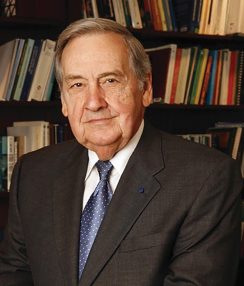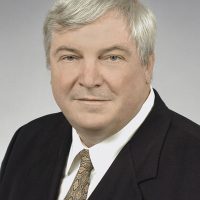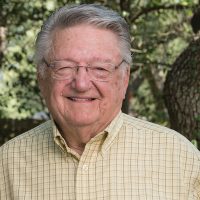Hall of Distinction
December 2, 2019
The Jackson School of Geosciences Hall of Distinction is reserved for people who have achieved exceptional standing within the geosciences in industry, government or academia. Professor Emeritus William L. Fisher was inducted during a ceremony at his retirement event in November 2018. Three additional members were inducted at the Evening of Thanks in April 2019: Martin P.A. Jackson, Paul L. Stoffa and Leslie P. White.
William L. Fisher, Fall 2018
In November 2018, the Jackson School of Geosciences held a retirement event to honor the remarkable achievements of Professor Emeritus Bill Fisher. During his nearly 60-year career, Fisher has played an integral part of the geosciences community at The University of Texas at Austin and beyond. So it only made sense that the retirement party also doubled as a surprise induction ceremony into the Jackson School’s Hall of Distinction.
“I can think of no other person who is more deserving of this honor than Bill,” Dean Sharon Mosher told the crowd at the retirement event. “For nearly six decades, Bill Fisher has been a driving force in geology in Texas and beyond, helping turn the Bureau of Economic Geology into a world-class research institution, launching the Jackson School of Geosciences, educating generations of geoscience leaders and shaping policy across the nation.”
Fisher retired after an amazing run at UT. He played a pivotal role in building the Jackson School of Geosciences, helping launch the school and serving as its inaugural dean. He led the Bureau of Economic Geology for 24 years.
He was chairman of the Department of Geological Sciences from 1984 to 1990 and director of the Geology Foundation from 1984 to 2006. His only break from UT was when he served the Ford administration as deputy assistant secretary for energy and assistant secretary for energy and minerals. Under Fisher’s vision and leadership, the bureau expanded from a small, well-respected organization to a research powerhouse. He inherited a bureau with a budget of $384,000. That grew to more than $20 million by the end of his tenure.
“If forming the Jackson School was Bill’s crowning achievement, most certainly the transformation of the Bureau of Economic Geology over a quarter century was his most important body of work,” said bureau Director Scott Tinker.
During his time at the university, Fisher also developed a strong friendship with businessman and philanthropist Jack Jackson and played Hall of Distinction The Jackson School of Geosciences Hall of Distinction is reserved for people who have achieved exceptional standing within the geosciences in industry, government or academia. Professor Emeritus William L. Fisher was inducted during a ceremony at his
retirement event in November 2018. Three additional members were inducted at the Evening of Thanks in April 2019: Martin P.A. Jackson, Paul L. Stoffa and Leslie P. White. an instrumental role in building a level of trust with Jackson that eventually led to the remarkable gift that founded the school. When university leadership needed a leader for the newly formed school, they turned to Fisher, who was named the school’s inaugural dean. Larry Faulkner, who served as university president at the time, said he didn’t seriously consider anyone else.
Fisher is credited with foundational discoveries in the geosciences. In 1967, he and colleague Joe McGowen introduced the concept of depositional systems, a fundamental part of modern stratigraphy and sedimentology. Fisher, along with colleague Frank Brown, introduced the concept of systems tracts, which linked contemporaneous depositional systems from source to sink. Fisher also led a 1987 assessment for the Department of Energy that turned around the then-prevalent view of natural gas scarcity. Fisher is among the founders of the field of seismic stratigraphy — a technique that revolutionized how energy companies search for hydrocarbons. It was developed in the late 1960s and early 1970s simultaneously by Exxon researchers and Fisher, who was working with colleagues at the Petrobras Brazilian oil corporation.
As an educator, Fisher was among the best, bringing his unsurpassed knowledge and unbridled energy to the classroom and field, and supervising 30 doctoral candidates and 153 master’s students. Fisher also served as president for numerous professional organizations for geoscientists. During his career, he was president of the American Association of Petroleum Geologists, the Association of American State Geologists, the American Institute of Professional Geologists, the American Geological Institute, the Gulf Coast Association of Geological Societies and the Austin Geological Society.
“I can think of no one more appropriate to be in our hall,” Mosher said.
Martin P.A. Jackson, Spring 2019
The late Martin P.A. Jackson was a world-renowned geoscientist and esteemed researcher at the Bureau of Economic Geology who was recognized globally for his groundbreaking work in the field of salt tectonics, with over 100 papers and three books on the subject.
“He’s the number one person in the world by a goodly margin,” said colleague Michael Hudec. “You cannot work effectively in salt tectonics without reading Martin’s work.”
In recent years, Jackson had been exploring signs of salt-tectonic activity on other planetary bodies, including Mars and Neptune’s moon Triton.
Born in Rhodesia (today Zimbabwe), Jackson initially studied old, hard Precambrian gneisses before moving to Texas and eventually becoming immersed in, as he called it, “a subsurface world of very young, soft rocks.” He came to the bureau in 1980 and in 1988 was instrumental in creating the bureau’s first industrial associates program, the Applied Geodynamics Laboratory (AGL).
Jackson’s new consortium became a model for those that followed. The AGL now maintains over 30 participating companies and is widely considered the world’s preeminent salt-tectonics research laboratory. Jackson’s numerous major career honors include the 2010 American Association of Petroleum Geologists’ Robert R. Berg Outstanding Research Award in recognition of outstanding innovation in petroleum geoscience research and the Geological Society of London’s 2013 William Smith Medal for outstanding research in applied geology. According to AAPG records, no one has won more AAPG technical awards, nor has anyone won in as many technical categories.
In addition to his preeminence as a research scientist, Jackson is equally regarded for his strength of character, gracious demeanor and unfailing humor. His friends and peers recall his kindness, humility, insightfulness and remarkable equanimity.
Paul L. Stoffa, Spring 2019
Paul L. Stoffa served as the director of the University of Texas Institute for Geophysics from 1994 to 2009 and Shell Distinguished Chair in Geophysics in the Department of Geological Sciences from 1997 to 2009.
He is currently Shell Chair Emeritus. Stoffa’s expertise is in multichannel seismic acquisition, signal processing, acoustic and elastic wave propagation, modeling and inversion of geophysical data, along with parallel computing. His research focuses on developing new seismic data acquisition and processing methods that can be used to address complex geologic problems.
“Paul has a wonderful imagination and is able to create new methods to acquire and process geophysical data,” stated his Society of Exploration Geophysicists (SEG) citation for honorary membership. “He has developed major acquisition and processing techniques in exploration geophysics that have made a huge contribution to our understanding of how to investigate the Earth’s interior.”
Stoffa received a B.S. in physics from Rensselaer Polytechnic Institute in 1970 and a Ph.D. in geophysics from Columbia University’s Lamont- Doherty Earth Observatory in 1974. He has published over 100 research articles in refereed journals and co-authored “Global Optimization Methods in Geophysical Inversion” as part of the Elsevier Advances in Exploration Geophysics book series. Stoffa served as a member of the Board of Governors of the Integrated Ocean Drilling Program Management International Inc. and served as chairman from 2005 to 2007. He was also a member representative (alternate) for The University of Texas at Austin to the Consortium for Ocean Leadership and is a member of SEG, the American Geophysical Union and the European Association of Geoscientists and Engineers.
Leslie P. White, Spring 2019
Leslie P. White thumbed a ride from Waco to Austin more than six decades ago looking for an education that would afford him a good career. He got it. But something else happened along the way.
White, who graduated from The University of Texas at Austin with a degree in geology in 1956, fell in love with the science and the university that educated him. The connections and relationships he made at UT are something he never forgot.
They are what prompted White and his wife, Dianne, to make a gamechanging gift to the Jackson School of Geosciences in 2018. They donated the family’s 266-acre Hill Country ranch to act as a living classroom for future generations of geoscientists and the first in a series of long-term scientific observatories that the school plans to set up around the state of Texas.
“Fieldwork is foundational for geosciences education at every level,” said Jackson School Dean Sharon Mosher. “I can’t stress how important Les and Dianne’s donation is to the school and the opportunities it affords us to educate young geoscientists. Their foresight and generosity will pay dividends for Texas and beyond for generations to come.”
White, who spent a career with Humble Oil and Exxon, began buying the property that would make up the ranch in 1995 and enjoyed it with family and friends throughout the years. The property — about an hour’s drive southwest of campus outside of Dripping Springs — will have a tremendous impact on the Jackson School, particularly for hydrogeology research and education.
“Geologists need to be outside,” White said. “They need to see geology where it lives. It thrills me to think about all the young people that will be out here.”
Back to the Newsletter



